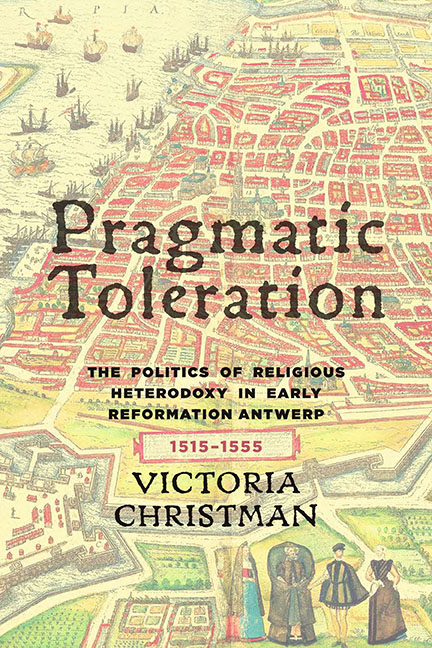Book contents
- Frontmatter
- Dedication
- Epigraph
- Contents
- Acknowledgments
- Introduction
- 1 The Lay of the Land: Government and Law in Brabant
- 2 Undercover: The Claes vander Elst Conventicle
- 3 Pragmatic Intolerance: Antwerp's Anabaptists
- 4 People of the Book: Heterodox Printers and Publishers in Antwerp
- 5 Between Stage and Scaffold: Rederijker Trials in Antwerp
- 6 Trade in Tolerance: The Portuguese New Christians in Antwerp, 1526–50
- Conclusion: Rulers and Religious Renegades
- Appendix 1 Chronology of Antiheresy Legislation in Brabant
- Appendix 2 Answers at Ghent
- Abbreviations
- Notes
- Bibliography
- Index
1 - The Lay of the Land: Government and Law in Brabant
Published online by Cambridge University Press: 15 March 2018
- Frontmatter
- Dedication
- Epigraph
- Contents
- Acknowledgments
- Introduction
- 1 The Lay of the Land: Government and Law in Brabant
- 2 Undercover: The Claes vander Elst Conventicle
- 3 Pragmatic Intolerance: Antwerp's Anabaptists
- 4 People of the Book: Heterodox Printers and Publishers in Antwerp
- 5 Between Stage and Scaffold: Rederijker Trials in Antwerp
- 6 Trade in Tolerance: The Portuguese New Christians in Antwerp, 1526–50
- Conclusion: Rulers and Religious Renegades
- Appendix 1 Chronology of Antiheresy Legislation in Brabant
- Appendix 2 Answers at Ghent
- Abbreviations
- Notes
- Bibliography
- Index
Summary
Although the teachings of the Reformers found fertile ground in many European cities, the political, intellectual, and commercial infrastructure of the city of Antwerp enabled the particularly rapid and broad dissemination of Reformed ideas during the first decades of the sixteenth century. Already by the mid-1520s, a veritable community of underground dissent had formed in Antwerp, connected via dissident networks throughout the Low Countries that provided an outlet for the reforming zeal that had revealed itself increasingly in the early years of the century. However, because of Antwerp's cosmopolitanism and determined political independence, the city's officials were intentionally slow in reacting to this threat. The rulers of Antwerp had many reasons for avoiding religious repression and developing strategies of pragmatic toleration in their city. They were able to follow through with such policies in part because of the leveraging power afforded by Antwerp's economic importance, and in part because of their unique position in relation to the religious legislation of the emperor. During his early years in office, Charles V changed the way crimes of heresy were understood and prosecuted in the Low Countries. Previously, religious crimes had fallen under the purview of ecclesiastical officials, but Charles's legislation transferred jurisdiction away from the church to local, secular officials. In so doing, the emperor inadvertently bestowed upon these officials the ability to undermine the very policies they were charged with enforcing.
Prior to the accession of Charles, the various provinces of the Low Countries operated as separate administrative units. They had been only partially united by the Burgundians in the fifteenth century, before the Habsburg Maximilian came to the throne via his marriage to Mary, Duchess of Burgundy, in 1482. Born in Ghent and raised in Brussels, Charles V inherited the territory of the Low Countries upon the death of his father, Philip I the Handsome, in 1506. When he came of age in 1515, official administration of the region transferred to him. But his responsibilities elsewhere frequently kept him away from his Netherlandish holdings. He spent most of his reign attending to problems in his other domains after becoming king of Spain in 1516, and Holy Roman emperor in 1519. In his absence, he appointed two queens-regent, his aunt Margaret of Austria (r. 1519–30) and sister Mary of Hungary (r. 1531–55), to rule in his stead.
- Type
- Chapter
- Information
- Pragmatic TolerationThe Politics of Religious Heterodoxy in Early Reformation Antwerp, 1515–1555, pp. 15 - 35Publisher: Boydell & BrewerPrint publication year: 2015

